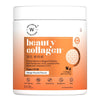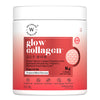Ever wondered if you should hop on the collagen bandwagon? Do you find yourself asking, 'Is collagen just for the ladies, or is there something in it for us too?' Well, you're in the right place. Welcome to the ultimate guide to collagen requirements for men. Get ready to explore the world of collagen, its incredible uses, and why it's time for us to join the collagen revolution. Whether you're here for the secret to healthier, more youthful skin or looking to supercharge your muscle-building journey, we've got all the answers you need. So, sit back, relax, and let's embark on this collagen adventure together to learn the importance of collagen in men. Get ready to discover why collagen isn't just a trend—it's a game-changer, FOR MEN TOO!"
Is men’s skin different from women’s?
There are many physiological and anatomical differences between men and women, and these differences can manifest unique pros and cons. But is it the same for skin? Human skin has a predetermined structure: the epidermis (outer layer), dermis (second layer), and subcutaneous layer (innermost), yet there are differences in male and female skin.
- Males are shown to produce more sebum.
- They also have larger pores as compared to females.
- Skin thickness reduces gradually in men, starting at the age of 20. In women, skin thickness decreases slowly at first but accelerates after menopause.
Wait, are we forgetting the hormones? Your hormones influence your skin's health heavily. For instance, sebum production is higher in men because of the presence of testosterone. Similarly, there are many such small differences in men's and women’s skin.
Do men really need collagen?
Despite the differences, the requirement for collagen in men and women is common.
Collagen is a structural protein that makes up not just the skin but also hair, nails, and bones. It is just one essential amino acid short of becoming a complete protein. It’s collagen that makes your skin youthful and plump. People with lower collagen levels usually have loose or sagging skin.
Collagen is a protein that is produced internally, but the human body produces less collagen after the age of 20. Every year, you miss out on about 1–1.5% of collagen. Simultaneously, your body also produces less elastin and hyaluronic acid, which help keep your skin hydrated and elastic. Hyaluronic acid also lubricates your joints, keeping them safe from wear and tear. Elastin increases the tensile ability of tissues. For example, making your blood vessels more elastic allows them to withstand high pressure. This is why seniors tend to have more wrinkles, sagging skin, and weak bones.
So, yes, men do need collagen. Whether you're aiming for a more youthful appearance, looking to support your active lifestyle, or simply interested in maintaining overall wellness, collagen can play a crucial role in your journey.
Collagen supplements
Collagen is available in non-vegetarian foods like fish, meat, and eggs. But with age, your body’s nutrient absorption capacity reduces. Furthermore, breaking down collagen from food is too much labor. This is why many individuals prefer collagen supplements or collagen peptides. These are hydrolyzed collagen supplements that are easy to digest and absorb. Having them regularly will give your body the necessary building blocks it needs to maintain good health in the skin, hair, nails, and bones.
When should you start taking collagen supplements?
Kids don’t require collagen supplements because their bodies produce enough collagen. Adults who are in their 20s or have crossed their 20s should start incorporating a collagen drink into their routine. The level of collagen in men and women who don’t eat meat is more likely to be lower, so these individuals might also need supplements to fill the nutritional gaps.
Some additional tips to maintain optimum collagen levels
Besides ingesting collagen, there are a few other things that you can do to ensure that your collagen levels are optimal and your skin looks as healthy as a baby's.
Use collagen peptides as a sports drink
Did you know your collagen powder can very well work as a sports drink? It contains 8 out of 9 amino acids and helps you build muscles and improve bone and joint health. Among the many sources of collagen, marine collagen is considered to be the best collagen. It’s pure and less likely to cause allergic reactions. So if you are planning to add a collagen drink to your every-day gym bag, try marine collagen powder for better results.
Vitamin C
The beauty industry has been going gaga over vitamin C for a few years now, and it deserves all the attention. Vitamin C is an antioxidant that can reduce the damage caused by UV rays by neutralizing free radicals. Most importantly, vitamin C is a popular collagen builder. It is a nutrient that helps build collagen naturally in the body.
Use sun protection every day
Excessive sun exposure is a major contributing factor to reduced collagen production. Start using sun protection every day when you step out. Men tend to ignore these little things, but these go a long way in protecting your skin and slowing the process of aging.
Wrapping Up
It's a fact that men often tend to overlook their beauty-related needs, perhaps due to the lingering stigma that such concerns are primarily reserved for women. However, it's truly inspiring to witness men across the globe shattering these stereotypes and embracing the importance of self-care. Collagen should undoubtedly find its place in everyone's daily regimen, regardless of gender. Why? Because it holds the power to defy premature aging of skin, hair, and bones. It’s never too late to start taking collagen supplements; start today!
Reference:
https://www.ncbi.nlm.nih.gov/pmc/articles/PMC6116811/
https://www.hsph.harvard.edu/nutritionsource/collagen/
https://www.frontiersin.org/articles/10.3389/fcell.2021.596702/full





























 DOWNLOAD NOW
DOWNLOAD NOW
